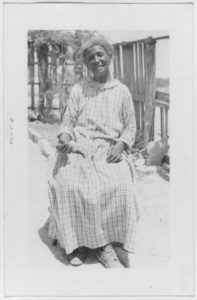
Johanna July
*The birth of Johanna July is celebrated on this date in 1850. She was a Black Seminole cowgirl.
From northern Mexico, July was the daughter of a Seminole Native American and a Black African slave. Her family had left Florida and settled in northern Mexico after the Seminole War ended in 1842. Around 1871, they crossed the U.S. border and arrived at Eagle Pass, Tex., a town on the Rio Grande. They agreed to clear troublesome Native Americans from the U.S. side of the river for the U.S. Army. In return, the Black Seminoles received a tract of land at Brackettville.
An old pioneer, Adam Wilson, taught July to ride as a girl. July preferred to ride bareback, with only a rope around the horse's neck. With her ropes of beads, gold earrings, and colorful clothes, July was soon famous throughout the area as an expert horsewoman. She became a horse breaker after her father died and her brother moved away because it was one of the few ways she could earn a living. July tamed wild horses for soldiers at nearby Fort Duncan by bucking horses into the Rio Grande. She kept them there until they calmed down. The horses, nervous about being in the water, were usually grateful to be led onto dry land again. They tended to obey July after that.
When she was 18, July married a Seminole scout named Lesley and went to live with him at Fort Clark. However, July was unhappy with domestic life and yearned to be with her horses. Not long after the wedding, July left Lesley and returned to her mother's house near the Rio Grande. For July, very little changed in her life as she got older.
After the death of her first husband, she married two more times and continued to tame horses and herd stock. About 1910, Johanna moved to Brackettville, where she lived in a small house on a hilltop near the cemetery. Family members recall her as that old lady who rode sidesaddle and went barefoot around the house. She died shortly after World War II and is buried in the Brackettville Seminole Cemetery.
